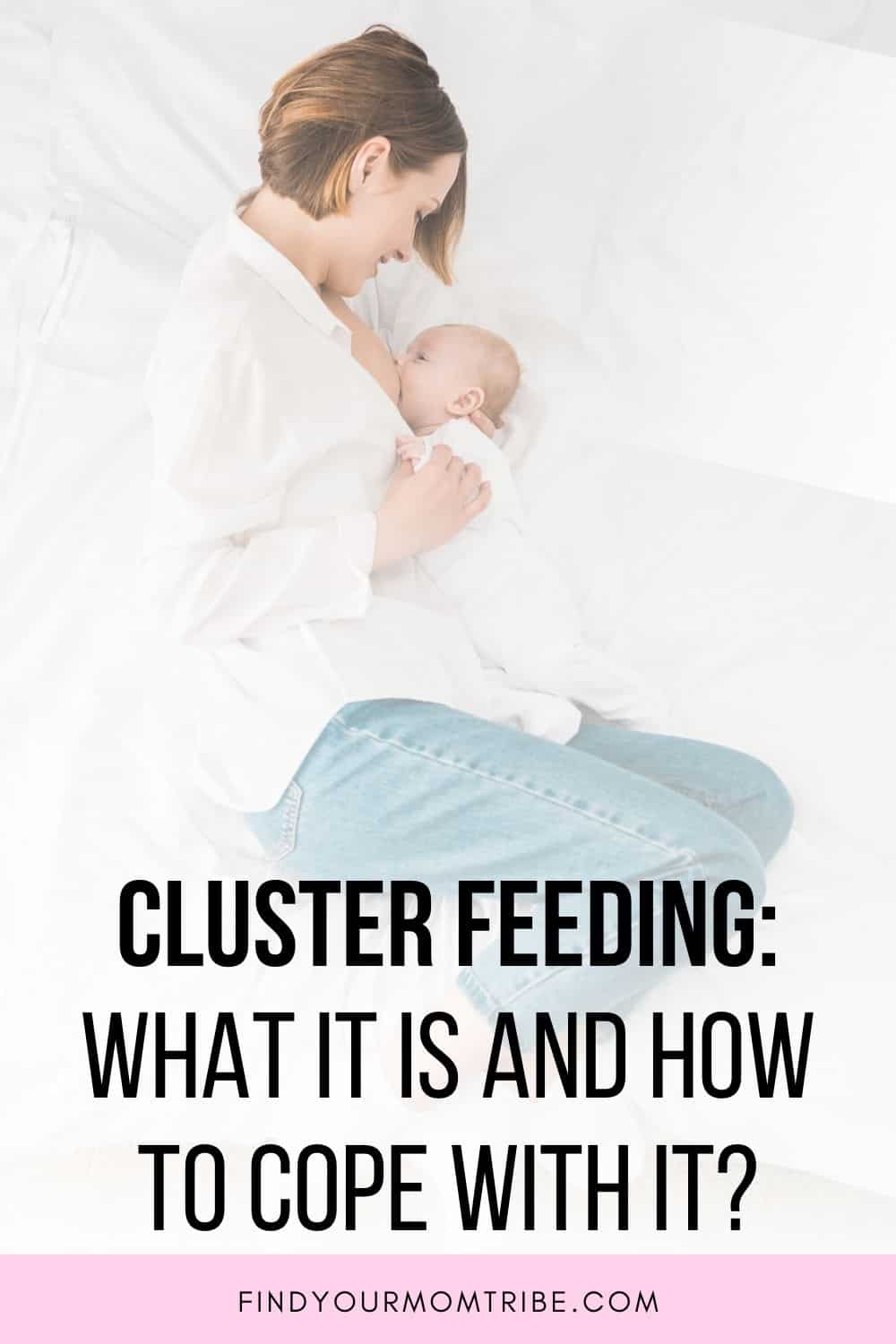One of the challenges that come with nursing your little one is cluster feeding. Just like it sounds, the term is used in describing nursing sessions when your baby wants to be fed more frequently than usual. It occurs in the first few weeks or months after your newborn’s arrival.
This is a normal infant feeding behavior, also referred to as bunch feeding, and it occurs at particular times of the day.
Defining precisely when feeding deviates from normal to become cluster feeding isn’t really easy, since every baby is different.
As a nursing mother, you have to look out for a clear increase in the number of times your baby feeds within a particular period compared to what it has been to determine if your baby is displaying this atypical feeding habit.
Typically, a newborn baby nurses in a kind of predictable pattern. In a day – that is a 24-hour period – your baby is expected to nurse about 8 to 12 times, which is probably every 2 to 3 hours.
However, babies who cluster feed will feed several times within that particular window.
Moms of fussy babies and babies who cluster feed often worry so much.
Hence, they tend to blame themselves and their breast, concluding that they are not producing enough milk to match their baby’s needs.
In most cases, this isn’t true.
Also, breast milk is supplied as demanded. When nursing a baby that cluster feeds, your supply will automatically increase to match the demand.
Feeding will lead to increased milk production to supply the needs of your growing baby.
Supplementing, however, can cause your supply to reduce.
Some babies may cluster feed in peace while others may fuss and cry, pulling on and off the breast in between feedings and not seeming happy generally.
It often occurs at night.
This can be frustrating and tiring for moms and can lead to worry. However, rest assured that it won’t last for so long.
It may be difficult to tell what the precise causes of this abnormal feeding habit are.
Nonetheless, several factors and reasons may bring about changes to your baby’s feeding pattern, and they include:

1. Slower Milk Flow
Babies tend to nurse longer in the evening to fill up their tummy because milk flow is often slower at night.
They also feed more to prepare for long sleep sessions and overnight growth.
Also, extra nursing may be an effort of your baby to make up for the times when your milk supply was low.

2. Growth Spurt
During the first couple of months of life, the rate at which babies grow is incredibly fast.
Your baby will need some frequent feedings because of this rapid growth and development.
Extra calories are needed to fuel your baby’s growth.
Generally, growth spurts happen around 3, 6, and 8 weeks after birth.

3. Developmental Leaps
Babies experience leaps in mental development just as they go through physical growth.
During these periods, babies acquire new emotional and social skills.
Your baby needs to feed more to keep up with these developments.

4. Nursing Is Comforting
Babies can’t help themselves, so when something goes wrong, they need their moms for comfort.
Breast milk contains hormones that help in developing your baby’s circadian rhythm.
Babies may cluster feed at night to soothe themselves to sleep.
Other self-comforting activities like finger sucking, eye rubbing, blanket stroking, or hair twirling may be noticed as babies grow older.

5. Illness or Teething
When sick or in pain, your baby can only cry and nurse for comfort. Potent antibodies that can fight illness are present in breast milk.
Your baby might cluster feed when there is a need to fight off an illness.
Also, nursing helps to ease pain and soothe the discomfort of teething in your baby.
RELATED: Best Teethers: 13 Best Buys For Your Baby in 2020

Formula-Fed Babies And Cluster Feeding
Normally, formula-fed babies feed less often than those who are breastfed, since formula takes a longer time to digest than breast milk.
Nonetheless, formula-fed babies also experience developmental leaps and growth spurts, and so may cluster feed like other breastfed babies.
Formula-fed babies may feed more frequently during these periods, but the interval between feeds may not change, and the baby may only feed a little more during each feeding session.

Supplementing Breast Milk With Formula
Feeding your little one in a clustery manner can be quite challenging. However, it is not a sign that your milk supply is low.
Sometimes, breastfeeding moms may be tempted to supplement with formula.
However, this will only make your body miss the signals you need to supply more milk for your baby’s needs.
Due to the less demand, your body will produce less milk.
You’ll only discover soon enough that you are not making enough milk to nurse your growing baby, and to keep up, you’ll continue to offer supplements!

Nursing Concerns
Bunch feeding is taken as normal under these conditions:
- It comes after birth when a mom’s full milk supply is intact.
- It happens during a typical period of 3 to 4 hours in 24 hours.
- The nursing mom has an adequate breast milk supply.
- The baby is putting on enough weight.
- The baby has frequent dirty and wet diapers.
However, there are certain situations that can raise concern over a baby’s feeding pattern and weight gain.
Your baby may not be getting enough milk if, by 2 weeks of age, he or she is yet to regain his or her birth weight.
You need to seek extra support and give more milk if your baby is not producing regular dirty and wet diapers and if stools remain dark.
Seek help from your lactation consultant or pediatrician if the following signs are exhibited in the early weeks:
- Baby nurses less than 8 to 12 times within a 24-hour period.
- Baby doesn’t wake up to nurse at night.
- You don’t feel your milk coming in after the third day.
- Nursing feels very painful all through a feed.
- Baby still exhibit hunger cues after feeding.
To know if your baby is getting enough milk, observe his feeding cues.
A normal breastfeeding session for a newborn typically lasts between 15 to 20 minutes.

If you are breastfeeding, you may not be able to tell how much milk your baby has had within this time.
After this time, observe your baby’s feeding cues to know if he has had enough.
You need to give more milk if your baby smacks his lips or put his hand in his mouth.
The same applies to bottle-fed babies. If your baby seems distracted while feeding, it’s possible that he has had enough.
However, this may differ from baby to baby. Normally, your baby will stop feeding when he feels full.
Also, watch your baby’s growth. If the weight and size are as expected, that means your baby is feeding well.
With the changes that occur in babies’ feeding patterns in the first few months, moms may get confused at some point.
If you have more concerns, try talking to your healthcare provider.
How To Cope With Cluster Feeding

1. Acceptance
Acknowledge the fact that your baby will be feeding a lot at particular times, probably between 6 and 10 pm.
Know that your baby is perfectly fine and reassure others who comment on how much your baby nurses that everything is okay and your baby is just growing.
Then accept that you’ll often be sitting in your favorite nursing position to spend time with your baby.
Anticipate this period and get ready for it.
You can make the best of this time if you spend it talking, singing, or reading to your little one.
You get to make those hours into a treasured moments to bond with your baby.
You can also try to relax; read a magazine or book, or make a catch-up call.

2. Get A Partner Or Help
There’s very little you can achieve during cluster feeding apart from nursing your little one, so you’d need someone to help you with all the other stuff while you enjoy your time with your baby.
Let family members or friends help you with the cooking and cleaning.
This can make cluster feeding considerably more bearable.

3. Eat Before Cluster Feeding
Make sure to eat before your baby’s cluster feeding time. If it’s 6 pm, eat before then.
You can’t have a good time with your little one if you are sitting hungrily while your baby slowly nurses.

4. Get Comfy
You’ll be sitting most of the time, so ensure that you and your baby are comfortable.
Whether you’re nursing in bed or on the sofa, get pillows to support your back and that of your baby, wear something soft and comfortable, and keep anything else you need close at hand, like water, snacks, books, TV remote, smartphone, or magazines.

5. Stay Hydrated
Ensure to keep water close when you sit down to cluster feed since you are into a thirsty business at that period.
A big glass of water with a slice of lemon at arm’s reach is recommended.
You can also find teas for breastfeeding to support your supply.
You might want to have a warm cup of lactation tea instead or herbal teas to stay hydrated.
Also, quality electrolytes from a health food store can serve well too.
| Image | Title | Price | Prime | Buy |
|---|---|---|---|---|
 | Super Mom Water Bottle with Time Marker for Busy Moms | PrimeEligible | Buy Now | |
 | Mom Life Water Bottle | PrimeEligible | Buy Now | |
 | Mama Bear Tumbler | PrimeEligible | Buy Now |
6. Look Out for Hunger Signals
If your baby tends to get fussy and irritable when hungry, try to act proactively.
Don’t wait for the cry to start before offering the breast.
Watch out for the early hunger cues and breastfeed immediately.

7. Wear Your Baby
It’s soothing for your baby to snug close to you in a sling or a wrap. You’ll be right there when your baby awakens from hunger to offer another meal.
Also, fussy babies can be kept content this way.
You also get to keep your hands free to do other things while your baby is wrapped to you.
You can even nurse on the go with practice.

8. Change Nursing Positions
Try varying nursing positions if you are finding it difficult to stay in one position.
If it’s difficult for you to sit on the couch for long hours, you can try nursing in the laid-back or side-lying positions.
Use pillows for some arms-free nursing sessions.
Also, wearing your baby can allow you to move around for a while and use your hands.

9. Don’t Forget Yourself
It’s natural for moms to focus more on their baby’s needs and not think so much about themselves.
You can’t handle the demands that go with taking care of your baby if you don’t take care of yourself too.
Make sure to eat well, drink enough water, and get some sleep when you can.
Whenever you get some time to yourself, make the best of it by doing some of those things you would normally do, like going to your favorite store or getting a pedicure.

10. Be Patient
Cluster feeding may seem to take forever, with all the frustration and stress.
However, it will pass.
There will always be “witching hours” even with the calmest of babies, so don’t worry so much about it and wait it out.
Forget every other thing during these moments and give your baby the needed attention. Don’t schedule so much that it falls into your baby’s cluster feeding time.
Focus more on your baby during these periods – you won’t have to deal with it forever.

Benefits Of Cluster Feeding
- Your baby gets to have longer stretches of sleep after feeding.
- It helps to increase your breast milk supply according to your baby’s demand.
- It helps your baby develop emotionally, physically, and neurologically.
- It increases your bonding time with your little one, which is beneficial to both baby and mom.

Risks Associated With Cluster Feeding
- It’s difficult to predict.
- It brings about nipple soreness.
- It can be frustrating and exhausting, both emotionally and physically.
- It often takes up time for other needs.
How To Move Night Cluster Feeding To Daytime

If your little one cluster feeds early in the day, that’s because the baby has no idea as to when it will be night.
You can help reset your baby’s inner clock to suit you with these tips:
1. Don’t Allow Long Stretches Of Daytime Naps
Seeing your baby sleep for a longer stretch of time in the day may look like a great opportunity to work in your own nap or do some of the things you’ve been putting off.
However, if you allow such long naps in the day, you’ll have to make up for it at night.
And that’s definitely going to leave you very tired.

2. Reset Your Baby’s Schedule Gradually
If you don’t want your baby to cluster feed at a particular time, you have to help adjust your baby’s feeding schedule to when you want it.
Your little one’s sense of time is limited, and you can’t expect much from a newborn as regards changing behavior.
You have to help make the adjustments by feeding your baby a little closer to when you want the bunch feeding to occur.
Make the necessary changes little by little.

3. Reduce Nighttime Activities
Try not to disrupt your baby’s sleep at night as much as possible.
If your baby wakes up hungry in the middle of the night, try to feed him or her without disruption.
If there’s a need to change his or her diaper, use minimal light and avoid noise as much as possible.
Your motions should be slow and soothing. You need to do what you have to without stimulation.
Don’t rush it. It will be easier for your baby to go back to sleep if he or she is relaxed.
Mastering cluster feeding can be beneficial to help moms manage the demands of their babies and still get the rest they need for themselves.
At first, it may seem difficult, annoying, and unending, but trying to figure out the best time to cluster feed and doing all you have to do properly can help you enjoy the benefits that go with it.
You can even get closer to having a full night’s rest long before you expect the possibility.

Cluster Feeding And Colic
A baby who feeds in a clustery manner might get fussy and cry, but if your baby gets fussier than normal, you may wonder if he has colic.
A baby with colic cries for 3 or more hours per day, at least 3 times a week, for a mostly 3-week period of time.
Symptoms appear during the baby’s first 3 to 6 weeks of life.
Colic and cluster feeding have some similarities, like the fact that they both occur unexpectedly and often come in the evening.
The difference between the two is that a baby with colic won’t be comforted with formula or breast milk, but a nursing session can soothe a baby who feeds in a clustery manner.
A colicky baby cries constantly, and this can bring about anxiety and stress because nothing can soothe him.
However, the condition is not a sign of a serious health issue. It’s only temporary and typically gets better on its own.
Colic has the following symptoms:
- Baby’s cry sounds more like screaming.
- Baby’s body and face looks contorted or tense.
- Crying at a particular period each day, mostly in the evening.
- Crying that hits the peak at 6 weeks and normally ends by 3 months old.
Wrap Up
Nursing your newborn baby comes with so many responsibilities and you need to find ways to cope with all the stress that comes along with it.
However, this won’t last forever.
Babies grow quickly, and before you realize, all the frustration and worrying will be in the past.
While it lasts, make the best out of your bonding time with your baby.
Like this article? Please share or pin it for later. You can also stay in the loop and follow us on Facebook, Instagram or Pinterest.

We love honesty! Find Your Mom Tribe is an Amazon Associate and we earn from qualifying purchases through affiliate links at no extra cost to you. Please see our full Amazon Affiliate disclosure for more information.

